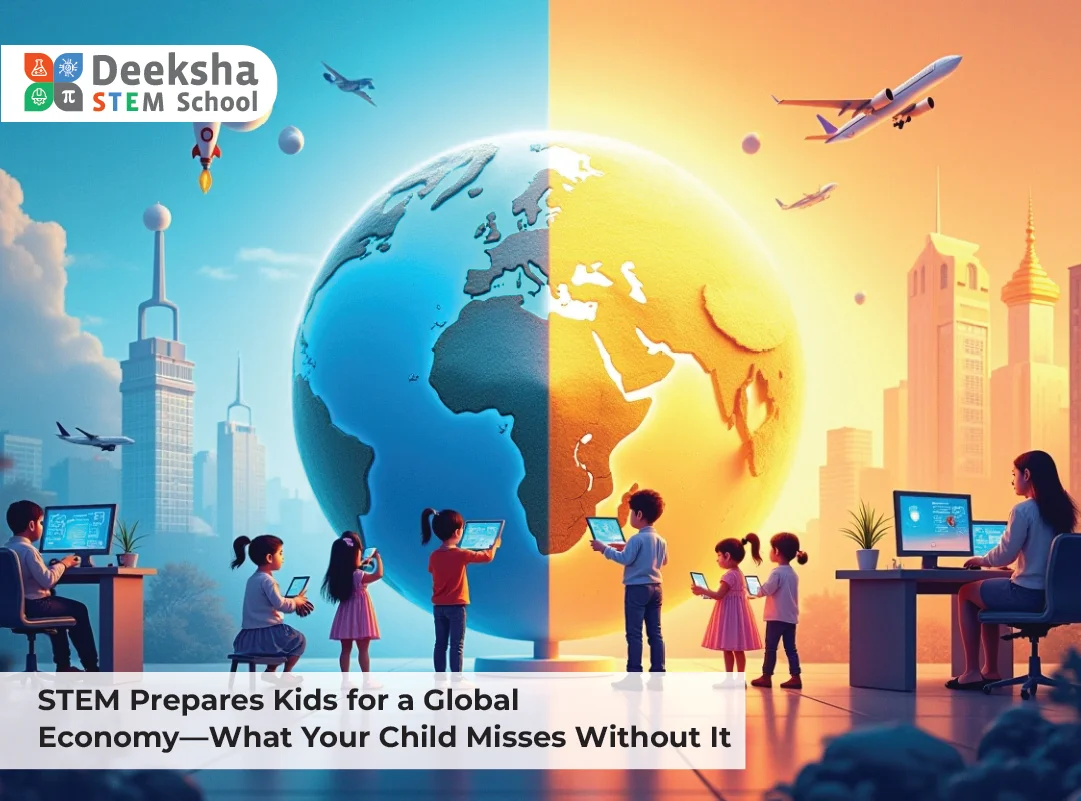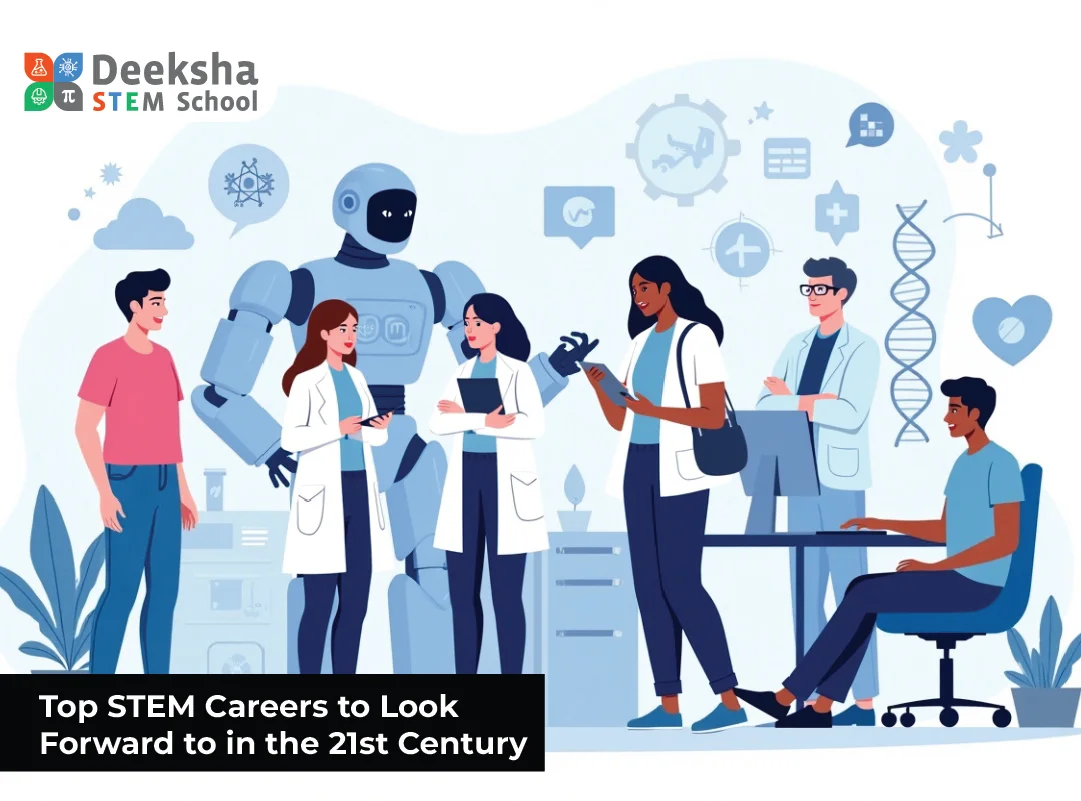STEM Prepares Kids for a Global Economy—What Your Child Misses Without It

The global economy is increasingly driven by technological advancements, innovation, and scientific discovery. Countries leading in STEM (Science, Technology, Engineering, and Mathematics) education are also leading in economic growth and job creation. Without STEM skills, students may find themselves unprepared for the evolving job market and miss out on future opportunities.
At Deeksha STEM Schools, we believe that preparing students for the future means providing them with a robust STEM education. A strong foundation in STEM ensures that children are ready to compete in a global workforce and contribute to transformative industries.
The Global Demand for STEM Professionals
1. STEM Careers are Driving Economic Growth
Studies show that economies investing in STEM education experience higher innovation rates and global competitiveness. By 2030, STEM-related careers are expected to dominate employment sectors worldwide, making up over 70% of new job opportunities.
- Artificial Intelligence & Automation: AI-driven technologies are changing industries, from manufacturing to healthcare, requiring skilled engineers and developers.
- Renewable Energy & Sustainability: The shift towards green energy requires experts in environmental science, engineering, and policy-making.
- Space and Aerospace Technologies: With space missions becoming more commercialized, the need for STEM-trained professionals is higher than ever.
2. How STEM Skills Enhance Career Opportunities
Children exposed to STEM learning from an early age develop:
- Critical Thinking: The ability to analyze and solve problems effectively.
- Technical Proficiency: Familiarity with emerging technologies such as AI, machine learning, and quantum computing.
- Adaptability: Resilience in a rapidly changing economic and technological landscape.
The Consequences of Avoiding STEM Education
1. Reduced Job Prospects in High-Growth Industries
Without STEM proficiency, students may struggle to qualify for lucrative and high-demand careers. The risk of automation replacing jobs is higher for those without STEM-related skills.
- Declining Competitiveness: Nations focusing on STEM produce a more skilled workforce, giving their economies a competitive edge.
- Limited Career Growth: STEM professions offer higher salaries and greater job stability compared to many non-STEM fields.
2. Missed Opportunities in Innovation and Entrepreneurship
STEM education doesn’t just prepare students for jobs—it fosters innovation and creativity. Many of today’s top global companies, such as Google, Tesla, and SpaceX, were founded by STEM professionals who leveraged their education to build groundbreaking technologies.
- Encouraging Entrepreneurial Mindsets: STEM learning promotes problem-solving, which is key to entrepreneurship.
- Developing Future-Ready Leaders: Leaders in global industries are those who understand and apply STEM principles.
How Deeksha STEM Schools Prepare Students for a Global Economy
At Deeksha STEM Schools, we integrate global perspectives into STEM education to ensure that students are well-equipped for future challenges.
1. Hands-On Learning and Real-World Applications
We emphasize project-based learning, where students work on real-world problems, simulating challenges faced by professionals in top global industries.
- Robotics and AI Training: Giving students hands-on experience in coding, robotics, and artificial intelligence.
- Industry Partnerships: Collaborating with tech and science organizations to provide exposure to cutting-edge advancements.
- Internship Opportunities: Connecting students with research institutions and companies to gain real-world experience.
2. Encouraging a Global Mindset
STEM education at Deeksha STEM Schools is designed to help students think beyond borders:
- International STEM Competitions: Encouraging participation in Olympiads and global science fairs.
- Cultural Exchange Programs: Exposing students to international scientific and technological innovations.
- Bilingual STEM Curriculum: Enhancing global communication skills essential for international collaboration.
The Future of Work and the Role of STEM
1. The Rise of Remote and Cross-Border Careers
With digitalization and globalization, STEM professionals are more likely to work across borders. The ability to collaborate internationally is a significant advantage in today’s job market.
- Global Collaboration in Research: Teams across continents work on AI development, space exploration, and medical breakthroughs.
- Remote STEM Careers: Many tech jobs allow professionals to work for international companies without relocating.
2. Preparing for Jobs That Don’t Yet Exist
The rapid evolution of technology means that many of today’s students will work in industries that do not yet exist. STEM education builds adaptability and lifelong learning skills necessary to navigate this uncertainty.
- Interdisciplinary Learning: Encouraging students to explore AI, biotechnology, and data science.
- Innovation and Creativity: Training students to think like inventors and problem-solvers.
Conclusion
The global economy is being shaped by advances in science and technology, and students must be prepared to meet these challenges. Avoiding STEM education can limit opportunities for career success, innovation, and global competitiveness.
Deeksha STEM Schools provide a forward-thinking STEM curriculum that equips students with the knowledge, skills, and mindset required for thriving in a technology-driven world. Investing in STEM today means securing a brighter, more successful future for your child.
To ensure your child is prepared for a rapidly evolving global economy, explore the STEM learning approach at Deeksha STEM Schools today.




